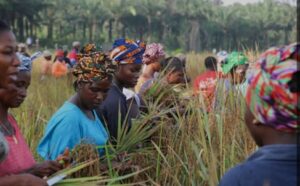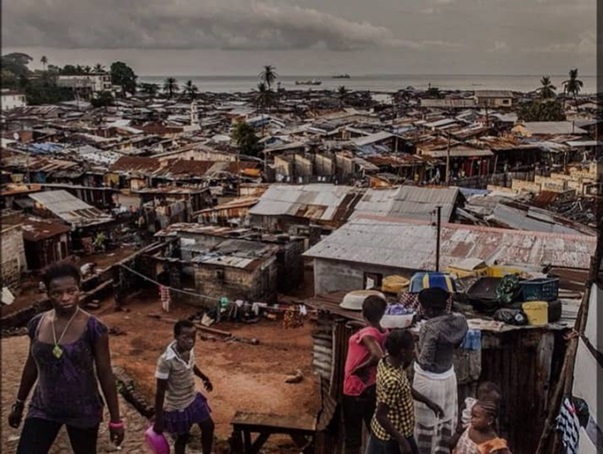By Sylvester Samai
Sierra Leone, a country on the west coast of Africa, is a paradoxical land of immense natural wealth and pervasive poverty. Despite its abundant resources, the nation’s people remain among the poorest in the world. This article explores the multifaceted reasons behind this paradox; delving into the historical, economic, social, and political factors that contribute to Sierra Leone’s status as a rich nation with poor people.
Sierra Leone is endowed with a wealth of natural resources. The country boasts of significant deposits of diamonds, gold, bauxite, and rutile (a titanium ore), etc. Its fertile soil supports a range of agricultural activities, and its coastal waters are rich in marine resources. Additionally, the nation has vast tracts of tropical rainforests, which are valuable for both timber and biodiversity.
Diamonds are perhaps the most famous of Sierra Leone’s natural resources. The country is renowned for its high-quality gemstones, including the rare and valuable “blood diamonds” that fueled much of the civil war in the 1990s. Despite the wealth generated by diamond mining, the industry has been marred by corruption, mismanagement, and exploitation.
In addition to diamonds, Sierra Leone has significant deposits of gold, bauxite, and rutile. Gold mining has been a part of the country’s economy for Centuries, providing income for artisanal miners and large mining companies alike. Bauxite, the primary ore of aluminum, and rutile are also major exports, contributing to the nation’s GDP.
Agriculture is the backbone of Sierra Leone’s economy, employing the majority of its population. The country’s fertile lands are suitable for growing rice, cocoa, coffee, and palm oil, among other crops. Fishing is another important sector, with the country’s coastal waters teeming with fish and other marine life.
To understand why Sierra Leone’s wealth has not translated into widespread prosperity, it is essential to examine the country’s history. Colonialism, civil war, and post-war recovery efforts have all played significant roles in shaping the nation’s economic and social landscape.
Sierra Leone was a British Colony from 1808 to 1961. During this period, the colonial administration focused on extracting resources for the benefit of the British Empire, rather than investing in the development of the local economy and infrastructure. This legacy of exploitation left the country with a labyrinth of weak infrastructure and a fragile economic framework at the time of independence.
The civil war, which lasted from 1991 to 2000, had devastating effects on Sierra Leone. The conflict, fueled in part by the illicit trade in diamonds, resulted in the deaths of tens of thousands of people and the displacement of millions. The war destroyed infrastructure, disrupted economic activities, and left a legacy of trauma and instability.
Since the end of the civil war, Sierra Leone has made significant strides in rebuilding its economy and society. However, the pace of recovery has been slow, and many challenges remain. Corruption, weak governance, and a lack of infrastructure continue to hinder development efforts.
Several economic factors are contributing to the paradox of this rich nation, albeit with poor people. This is mostly due the structure of the economy, the distribution pattern of wealth, and the role of foreign direct investments.
Sierra Leone’s economy is heavily reliant on its natural resources. While these resources generate significant revenue, they also make the country vulnerable to fluctuations in global commodity prices. Additionally, the focus on resource extraction has limited the development of other sectors, such as manufacturing and services, which could provide more stable and diverse sources of income.
The wealth generated by Sierra Leone’s natural resources is not evenly distributed. Small elite individuals and groups control much of the country’s wealth, while the majority of the population remains staked in poverty. This inequality is exacerbated by corruption and mismanagement, which divert resources away from public services and development projects.
Foreign companies play a significant role in Sierra Leone’s resource extraction industries. While foreign investment can provide much-needed capital and expertise, it can also lead to exploitation. Many foreign companies have been accused of failing to invest in local communities, paying low wages, and causing environmental damages.
Social factors, including education, health, and gender disparities, also contribute to poverty in Sierra Leone. Access to quality education is limited in Sierra Leone, particularly in rural areas. Many children do not attend school regularly, and those who do often receive a subpar education due to a lack of resources, trained teachers, and adequate facilities. This limits their future economic opportunities and perpetuates the cycle of poverty.
The healthcare system in Sierra Leone is underdeveloped and underfunded. The country has some of the highest maternal and child mortality rates in the world, and diseases such as malaria, typhoid, and tuberculosis are prevalent. Poor health outcomes reduce productivity and increase economic burdens on families.
Gender disparities play a significant role in perpetuating poverty. Women and girls in Sierra Leone face additional barriers to education, employment, and economic participation. Traditional gender roles and cultural practices limit their opportunities and contribute to their vulnerability to poverty.
Political factors, including bad governance, corruption, and policy mismatches, have a profound impact on poverty in Sierra Leone. Weak governance and widespread corruption are other major obstacles to economic development in Sierra Leone. Corruption diverts resources away from public services and development projects, while weak institutions and lack of accountability hinder effective governance. This creates an environment where the benefits of the country’s wealth are not equitably distributed.
Policy decisions also play a crucial role in shaping the economic landscape. Poor policy choices, such as inadequate investment in infrastructure and social services, have limited economic growth and development. Additionally, frequent changes in government and policy direction create uncertainty and disrupt development efforts.
The role of international organisations and foreign governments in Sierra Leone’s development cannot be overlooked. While international aid and development assistance have provided crucial support, they have also sometimes perpetuated dependency and failed to address underlying issues.
International aid and development assistance have played a critical role in supporting Sierra Leone’s recovery and development efforts. Various international organisations, non-governmental organisations (NGOs), and bilateral partners have provided financial and technical assistance to support development projects and programmes. While international aid is vital, it can also create dependency and undermine local ownership of development processes. Sustainable development requires building local capacity and institutions, rather than relying solely on external support.
Environmental degradation and sustainability are critical issues in Sierra Leone. The country’s natural resources are at risk due to deforestation, mining activities, and climate change. Deforestation, driven by logging and agricultural expansion, threatens Sierra Leone’s rich biodiversity and contributes to environmental degradation. Mining activities, particularly in the diamond and gold sectors, cause significant environmental damage, including soil erosion, water pollution, and habitat destruction.
Climate change poses a significant threat to Sierra Leone’s development. Rising temperatures, changing rainfall patterns, and extreme weather events impact agriculture, water resources, and coastal communities. Addressing climate change is essential for ensuring long-term economic stability and food security.
Despite the challenges, there are pathways to prosperity for Sierra Leone. By addressing key issues such as governance, corruption, education, healthcare, and economic diversification, the country can harness its natural wealth for the benefit of its entire people. Improving governance and accountability is crucial for ensuring that the benefits of Sierra Leone’s natural resources are equitably distributed. This requires strengthening institutions, enhancing transparency, and promoting accountability in the use of public resources.
Investing in education and healthcare is essential for breaking the cycle of poverty. Improving access to quality education and healthcare services can enhance human capital, increase productivity, and promote economic growth. Economic diversification is crucial to reducing dependency on natural resources and creating more stable and diverse sources of income. Promoting sectors such as manufacturing, services, and tourism can provide new economic opportunities and reduce vulnerability to global commodity price fluctuations.

Empowering women and girls is critical for poverty reduction and sustainable development. Ensuring that women have equal access to education, employment, and economic opportunities can have significant positive impacts on economic growth and development.
Community-based approaches that involve local people in decision-making processes can help to ensure that development initiatives are relevant and effective. Supporting community-based organisations and initiatives can promote sustainable development and improve living conditions at the local level. Addressing environmental sustainability is essential for ensuring long-term economic stability and food security. This involves promoting sustainable development practices, protecting natural resources, and addressing the impacts of climate change.
Sierra Leone is a nation rich in natural resources, yet its people remain among the poorest in the world.
This paradox is the result of a complex interplay of historical, economic, social, and political factors. By addressing key issues such as governance, corruption, education, healthcare, economic diversification, and environmental sustainability, Sierra Leone can harness its wealth for the benefit of its people. Through concerted efforts and international support, the country can move towards a future where its natural riches translate into prosperity for its citizens.


